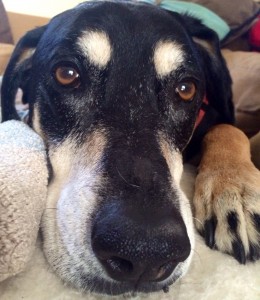
Did you know that May is National Pet Cancer Awareness month? I am a “pet parent” to three amazing dogs, two of whom do therapy work with me. Before I worked in “human” oncology, I was privileged to work with many of the outstanding veterinary oncologists at the Ryan Veterinary Hospital of the University of Pennsylvania. I had no clue about cancer and pets before I started working in Veterinary social work, except that my first family dog, Shadow, died suddenly when a tumor “burst” in his liver. I was 12 and back then there really was not a lot of education about cancer in companion animals, let alone about treatment options.
More recently, my sister and brother in law were faced with a diagnosis of Osteosarcoma in their beloved twelve year old Doberman Coonhound, Riley. My sister took Riley to the vet in January after noticing swelling around a joint in his paw. Sure enough, it was cancer. The family went through some of the same things human families go through when faced with a cancer diagnosis- finding a specialist, weighing treatment options, financing veterinary cancer care, and ultimately, deciding when it was time to stop treatment.
Sadly, despite aggressive treatments including amputation and chemotherapy, Riley’s cancer metastasized to his lungs two months after his diagnosis. They decided to focus on palliation and quality of life. They focused on Riley’s bucket list, which included “driving” a car and eating bacon in the sun. When Riley’s symptoms became intolerable, they made the difficult decision to let him go. They are grieving immensely for their cherished pet and are asking questions like, “did we do enough?” and “did we do the right things?” What I noticed is that the parallels between the human and veterinary cancer experience are striking.

Let’s look as some facts about cancer and pets:
- Did you know that cats and dogs receive chemotherapy and radiation? They receive many of the same drugs that humans do.
- Cancer care for pets can be expensive and MOST pets in the United States are not insured.
- Cancer accounts for nearly 50% of all disease related pet deaths each year (Veterinary Cancer Center).
- Dogs get cancer at roughly the same rate as humans (AVMA.org).
- One in four dogs will die of cancer (MorrisAnimalFoundation.org).
- Cancer risk increases with age in both cats and dogs.
- Pets get cancers like lymphoma, melanoma and sarcomas, just like humans!
Notice some of the remarkably similar facts about cancer and its incidence and treatment between humans and companion animals?
One of the best things I ever did was purchase pet insurance for my three fur kids. The peace of mind that this coverage gives me, should I ever have to face a cancer diagnosis and treatment for one of the dogs, is wonderful. Most pet health insurance plans have coverage for cancer treatment and some even cover complimentary therapies like acupuncture. For more information about pet health insurance check out this article with links to the providers (Pet insurance providers). Be sure to do your homework and ask specific questions. For example:
- Do you cover pre-existing conditions?
- Do you have a maximum dollar amount you will pay for the lifetime of a pet?
- Do you cover chemotherapy, radiation and diagnostic tests for cancer?
- Do you cover complimentary therapy like acupuncture or physical therapy?
Another important difference with pet health insurance is that you are still expected to pay for the cost of the veterinary care and then submit a claim, for which you are reimbursed. You can also expect your quote to depend on important factors like your pets age and breed.
Increase your awareness of cancer in pets!!!
The Veterinary Cancer Society has published the following list of signs and symptoms to be aware of with your animals.
- Abnormal swellings that persist or continue to grow
- Sores that do not heal
- Weight loss
- Loss of appetite
- Bleeding or discharge from any body opening
- Offensive odor (and not ate being sprayed by a skunk!)
- Difficulty eating or swallowing
- Hesitation to exercise or loss of stamina
- Persistent lameness or stiffness
- Difficulty breathing, urinating, or defecating
If you are concerned about symptoms your animal may be having, take them to your Veterinarian as soon as possible. I always err on the side of caution with my animals. I know that I have to act as their voice as well as their decision maker. This is a tough position to be in as a caregiver of a pet with cancer. Just as with human cancers, earlier diagnosis and treatment CAN make a difference. Take care of yourself and Fluffy. Our pets are enormous supports, especially when going through a life threatening illness; but they also need our support too.
Pets are family members, and coping with a cancer diagnosis and treatment in our beloved furry companions can be frustrating, scary, nerve racking and sad. My sister set an amazing example as a care giver for a pet with cancer. I know Riley was grateful for all she did. Love you always, Riley. You are missed.
Learn more about cancer in companion animals on OncoLink’s Veterinary Oncology section.